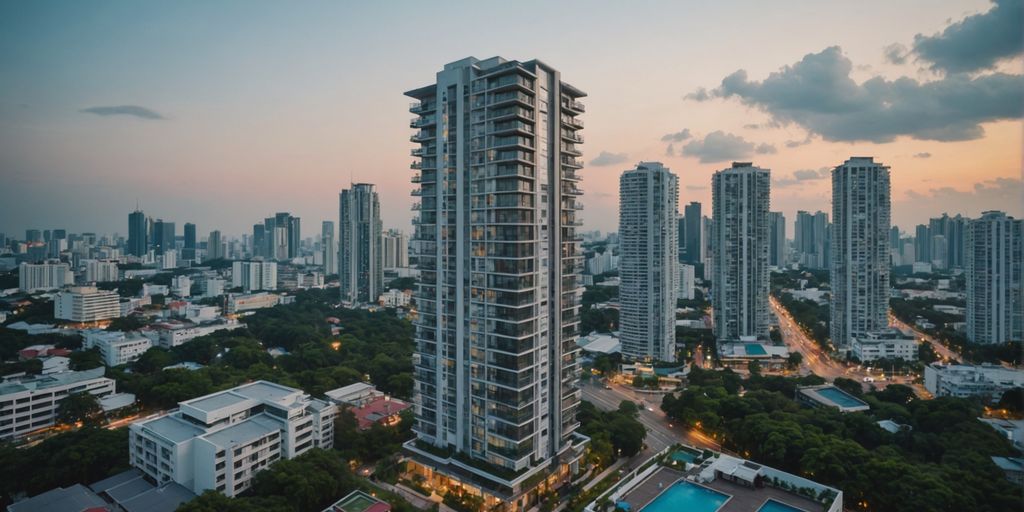The Thailand Condominium Act sets the rules for foreign ownership of condominiums in Thailand. It can be complicated, especially for non-Thai nationals. This article aims to simplify the Act and explain how foreigners can buy, inherit, and own condos in Thailand. We’ll also discuss the role of legal advisors and compare Thai laws with those of other countries.
Key Takeaways
- Foreigners can own condos in Thailand but must meet specific requirements under Section 19 of the Condominium Act.
- The 49% foreign ownership quota limits the number of units foreigners can own in a condominium building.
- Legal advice is crucial when buying a condo in Thailand to avoid common pitfalls.
- Inheritance laws for condos by foreigners are covered under Sections 19/5 and 19/7 of the Act.
- Freehold ownership is possible for foreigners, offering them full ownership rights.
Overview of the Thailand Condominium Act
The Thailand Condominium Act, established in 1979, governs the ownership and management of condominium properties in Thailand. This law is crucial for both Thai nationals and foreigners interested in purchasing condominium units in the country. Understanding the key provisions and recent amendments of this Act is essential for anyone looking to invest in Thai real estate.
Eligibility Criteria for Foreign Ownership

Section 19 Requirements
Foreigners and legal entities can own a condo unit in Thailand under certain conditions. Section 19 of the Condominium Act outlines these requirements. Foreigners must meet specific criteria, such as having a valid visa and proving the funds used to purchase the unit were transferred from abroad. Additionally, the total foreign ownership in a condominium cannot exceed 49% of the total area of all units combined.
Legal Entities Considered as Foreigners
Under Thai law, certain legal entities are also considered foreigners. These include companies registered outside Thailand and Thai companies with more than 49% of shares held by non-Thais. This classification ensures that the foreign ownership quota is not exceeded.
Financial Requirements
Foreign buyers must show that the funds used to purchase the condo were transferred from abroad in foreign currency. This is a crucial step to comply with the Condominium Act. The bank handling the transaction will issue a Foreign Exchange Transaction Form, which is necessary for the registration of ownership.
It’s important to note that short term rentals in condominiums are often subject to strict regulations, and owners should be aware of these rules to avoid legal issues.
Inheritance of Condominium Units by Foreigners
Section 19/5 Provisions
Section 19/5 of the Condominium Act allows qualified foreigners to register ownership of a condominium unit acquired by inheritance. However, this is only possible if the registration does not exceed the 49% foreign ownership quota within the condominium. Foreign heirs must meet the qualifications outlined in Section 19 to retain ownership. If they do not, they are required to sell the unit.
Section 19/7 Provisions
Under Section 19/7, if a foreigner inherits a condominium unit but does not qualify under Section 19, they must dispose of the unit within one year. Failure to do so authorizes the Director-General of the Land Department to sell the unit. The department retains a 5% fee from the sale price before any deductions or taxes.
Registration Process
The registration process for foreign ownership of an inherited condominium unit involves several steps:
- Verification of Qualifications: The foreign heir must provide proof of qualifications, such as foreign currency exchange transaction documents.
- Compliance with Ownership Quota: Ensure that the unit falls within the 49% foreign ownership quota.
- Submission of Documents: Submit all required documents to the Land Department’s branch or provincial office.
- Final Registration: Once verified, the registration of foreign ownership is straightforward.
Inheritance laws in Thailand can be complex, especially for foreigners. It’s crucial to understand the legal requirements to avoid complications.
Foreigners interested in property ownership, including Luxury Villas For Sale, should consult legal advisors to navigate these regulations effectively.
Step-by-Step Guide to Buying a Condominium in Thailand
Initial Considerations
Before diving into the purchase, it’s crucial to evaluate your needs and preferences. Consider the location, amenities, and type of condominium that suits your lifestyle. For instance, a brand new condo in Bangtao offers various amenities and nearby attractions, making it an attractive option for many. Additionally, understanding the Phuket Real Estate Market can provide insights into property values and trends.
Legal Due Diligence
Conducting thorough legal due diligence is essential. This includes verifying the property’s title deed, ensuring there are no outstanding debts, and confirming that the seller has the legal right to sell the property. Hiring a legal advisor can help navigate these complexities and avoid common mistakes when buying a condo in Thailand.
Finalizing the Purchase
Once due diligence is complete, the next step is to finalize the purchase. This involves signing the sales agreement, transferring the necessary funds, and registering the property with the Land Department. It’s important to note that most foreigners use the condition of transferring foreign currency to Thailand for the purpose of buying a condominium. This step ensures compliance with Thai property laws and secures your ownership rights.
Buying a condo in Thailand is an attractive option for many foreign nationals due to fewer nationality-related restrictions under the Condominium Act.
By following these steps, you can make an informed and secure investment in the Thai real estate market.
Freehold Ownership for Foreigners
Definition and Benefits
Freehold ownership allows foreigners to own a condominium unit outright, providing them with full ownership rights. This type of ownership is highly sought after due to the security and permanence it offers. Unlike leasehold ownership, freehold ownership does not have an expiration date, making it a more attractive option for long-term investment.
Legal Conditions
Foreigners can own up to 49% of the total area of all units in a condominium building. This is regulated under Section 19 of the Condominium Act. Foreigners must meet specific criteria to qualify for ownership, such as bringing foreign currency into Thailand or having permanent residency. It’s important to note that ownership is not freely transferable between foreigners and is restricted by condominium laws.
Common Misconceptions
One common misconception is that foreigners can own land in Thailand. However, this is not true; foreigners can only own condominium units. Another misconception is that freehold ownership can be easily transferred to another foreigner. In reality, the right of foreign freehold ownership ends at the death of the foreigner who qualified for ownership under the Condominium Act. Foreigners who inherit a condominium unit must qualify for ownership under Section 19 or dispose of the unit within one year.
A hotel managed luxury condo in Layan Beach offers luxurious residences with hotel amenities. Units range from 25-104 sqm, near the beach with a rental program available.
Highlights
- Security and permanence of freehold ownership
- Up to 49% foreign ownership allowed in a condominium building
- Ownership not freely transferable between foreigners
- Foreigners cannot own land, only condominium units
Common Legal Issues and How to Avoid Them
When buying a condominium in Thailand, several legal issues can arise. Understanding these issues and how to avoid them is crucial for a smooth transaction.
Exceeding the 49% Foreign Ownership Quota
Foreigners are allowed to own up to 49% of the total floor area of all units in a condominium building. Exceeding this quota can lead to legal complications. It’s essential to verify the current foreign ownership percentage before making a purchase.
Land Ownership Issues
Foreigners cannot own land in Thailand, which can complicate condominium ownership. Ensure that the land on which the condominium is built is legally owned by the developer or the condominium juristic person.
Contractual Pitfalls
Not having obtained legal advice on the condominium sale and purchase agreement can lead to unexpected issues. Key terms and conditions, such as payments in a third-party escrow account or directly to the seller, should be clearly defined. Conducting due diligence on a project or unit is also crucial to avoid surprises after signing the purchase agreement.
Always consult with a legal advisor to navigate these complexities and ensure a secure investment.
Role of Legal Advisors in Condominium Transactions
Legal advisors play a crucial role in condominium transactions in Thailand. Their expertise ensures that the process is smooth and legally sound, protecting the interests of all parties involved.
Importance of Legal Oversight
Having a legal advisor oversee the transaction is essential. They conduct due diligence to verify the property’s condition and legal status. This includes checking with government offices like the Land Department and Municipality Office. A thorough due diligence report can prevent future legal issues.
Choosing the Right Lawyer
Selecting a lawyer who specializes in property acquisition is vital. Look for someone with experience in the local market and a good track record. It’s also beneficial to choose a lawyer who can communicate effectively in your language.
Legal Fees and Costs
Legal fees can vary, but it’s important to understand the costs upfront. Typically, fees cover due diligence, drafting or reviewing the sale and purchase agreement, and overseeing the transfer registration at the Land Department. Knowing these costs can help you budget effectively for your property purchase.
Co-ownership of Common Areas
Rights and Responsibilities
In a condominium, the common areas are owned collectively by all the unit owners. These areas include walkways, hallways, gyms, pools, and laundry rooms. Public utilities and amenities, such as elevators, water supply systems, and electricity supply systems, are also part of the common areas. Each joint-owner is entitled to the common property and must share the responsibilities that come with it.
Maintenance and Management
The common areas, amenities, and utilities are managed by all the individual unit owners through a management association known as a "Condominium Juristic Person." This association ensures that the common areas are well-maintained and that all necessary repairs are carried out promptly. Joint owners must share the costs of maintaining these areas, including expenses for common services, equipment, and facilities.
Dispute Resolution
Disputes among joint owners regarding the use and maintenance of common areas are not uncommon. To resolve these issues, the Condominium Act provides a legal framework that includes mediation and arbitration processes. This ensures that conflicts are resolved fairly and efficiently, maintaining harmony among the residents.
Living in a premier condo near Bangtao by Ocean Worldwide offers a luxurious lifestyle with amenities like a rooftop pool and proximity to Bangtao Beach and other amenities.
By understanding their rights and responsibilities, unit owners can contribute to a harmonious and well-maintained living environment.
Comparing Thai Condominium Laws with Other Countries
Key Differences
When comparing Thai condominium laws to those in other countries, several key differences emerge. Foreigners can own condominium units in Thailand, but they cannot own land. This is in contrast to countries like the United States, where foreign nationals can own both land and property. In Thailand, the Condominium Act allows foreigners to own up to 49% of the total area of all units in a condominium building.
Advantages and Disadvantages
The Thai Condominium Act offers both advantages and disadvantages for foreign investors. One major advantage is the ability to own a condominium unit outright, providing a sense of security and investment potential. However, the 49% foreign ownership quota can be a significant limitation. In contrast, countries like Singapore have more lenient rules, allowing foreigners to own property with fewer restrictions.
Case Studies
Consider the case of a foreign investor looking to buy a condominium in Thailand. They must navigate the 49% foreign ownership quota, which can be a hurdle. On the other hand, in countries like Malaysia, the Malaysia My Second Home (MM2H) program offers more straightforward paths to property ownership for foreigners. This makes Malaysia a more attractive option for some investors.
The Thai Condominium Act is designed to balance foreign investment with local ownership, ensuring that the majority of property remains in Thai hands.
In summary, while Thailand offers unique opportunities for foreign condominium ownership, it also comes with specific challenges that investors must carefully consider.
Impact of the Condominium Act on the Real Estate Market

Market Trends
The Thailand Condominium Act has significantly shaped the real estate market. Foreign investment has surged, particularly in urban areas like Bangkok and Pattaya. This influx has driven up property values and spurred new developments. However, the Act’s restrictions on foreign ownership, such as the 49% quota, have also created a competitive market for available units.
Foreign Investment
Foreign investors are drawn to Thailand’s real estate market due to its potential for high returns. The Condominium Act allows foreigners to own freehold condominium units, making it an attractive option. However, the requirement to transfer funds from abroad can be a barrier for some investors. Additionally, the rise of short term rentals has provided an alternative revenue stream, further enticing foreign buyers.
Future Outlook
The future of Thailand’s real estate market looks promising, with continued interest from foreign investors. Recent amendments to the Condominium Act aim to provide better protections for buyers, which could boost confidence in the market. However, challenges such as the 49% foreign ownership cap and economic fluctuations remain. Policymakers are expected to continue refining the Act to balance foreign investment with local interests.
The Condominium Act has been pivotal in shaping Thailand’s real estate landscape, offering both opportunities and challenges for foreign investors.
The Condominium Act has changed the real estate market in big ways. It has made buying and selling condos easier and safer for everyone. If you want to learn more about how this law affects you, visit our website. We have lots of helpful information and tips to guide you.
Conclusion
In summary, while the Thailand Condominium Act does provide a pathway for foreign nationals to own condominium units, it comes with its own set of challenges and requirements. Foreigners must navigate through specific legal criteria, particularly those outlined in Section 19, to qualify for ownership. Additionally, the process can be complex and may require legal assistance to ensure compliance with all regulations. Despite these hurdles, owning a condo in Thailand remains an attractive option for many, offering a viable alternative to land ownership, which is restricted for foreigners. Understanding the intricacies of the Condominium Act is crucial for any foreigner considering this investment, ensuring a smooth and lawful transaction.




